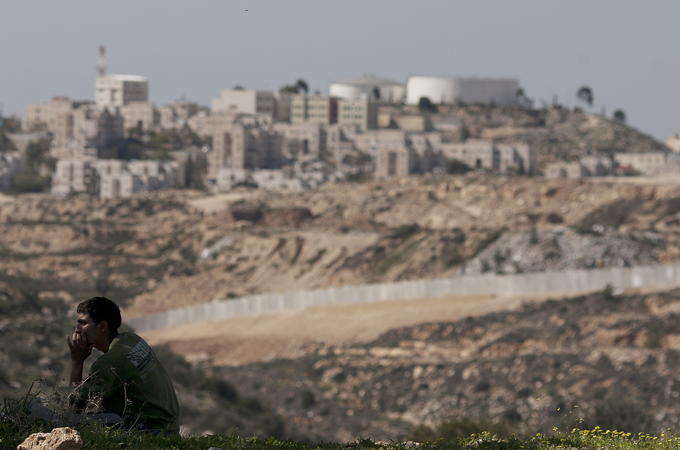In search of a ‘solution’ in Palestine
The conflict in Israel and Palestine is a generational conflict, and as such, it might take generations to resolve.

 |
| ‘Americans once believed owning slaves was right … a majority of Israelis believe that apartheid is OK, too’ [EPA] |
It’s not true that Palestinians and Israelis don’t agree about anything.
Several weeks ago, I had the mildly frustrating experience of informally debating with an Israeli intelligence officer. We argued back and forth until I finally exclaimed that the only relevant topic worth discussing at this stage in the conflict’s development was how to implement the one-state solution. His emphatic reply was that no Israeli would ever agree to equal citizenship and rights.
More recently, I had the mildly frustrating experience of speaking with a Palestinian academic. The man declaimed against the occupation, the Palestinian Authority, the Arab states, nationalism – and the one-state solution.
Needless to say, I was surprised. So I pressed him on his insistent indictment of the one-state programme.
The source of his opposition was easy to understand. He made the same type of claim that the Israeli intelligence officer had; that 99 per cent of Israelis would never agree to live alongside the Palestinians as equals. Furthermore, he argued, there was not overwhelming Palestinian public support for equal rights in either Israel or Palestine. It is therefore wrong for public intellectuals, journalists, activists and others to promote the one-state idea. There is no room in this reality-based universe for dreamers, and the best we can do with our privilege is to react to public opinion.
I acknowledged most of his premises, but disagreed with his conclusions.
There can be no doubt that the overwhelming majority of Israelis reject the idea that Jewish privilege in Israel and Palestine must come to an end. Today, many Israelis reap the benefits of apartheid and a few feel its ill-effects directly (although the occupation has corroded the social fabric of Jewish-Israeli life in the country). They, like anyone in their position, cannot be expected to see the virtues of equal rights on their own. I understand why the Israeli officer argued the way he did.
The Israeli-public-opinion argument becomes much more problematic for me, however, when a Palestinian argues that Palestinians ought to calibrate their struggle to conform to “reality”. The argument is analogous to South Africans deliberating on the impossibility of their course because white public opinion was overwhelmingly in opposition.
No. The sensible thing for Palestinians to do is to doggedly pursue justice, irrespective of the opinion of the “average Israeli” – which is just what they are doing. Israeli opinion can be acted upon and aligned with global norms of proper conduct over time, but only through the pressure applied by Palestinian agency and struggle. The Boycott, Divestment and Sanctions movement is one example of that agency today.
Here, it bears mentioning the historical precedent. Men and women in the West Bank, Gaza, Israel and the diaspora have waged their struggle without flagging for more than 60 years. Through their energetic perseverance, they insistently asserted their right to exist to an Israeli public and world that once believed that “there is no such thing as Palestinian people”. One day, those same Israelis will learn to say “Palestinians are our equals”. Israeli public opinion can be moved because it has been moved.
The second argument presented by the Palestinian academic – that elites, particularly in the diaspora, have no business arguing for one or another course of action – is one that I have been hearing with greater and greater frequency. The argument continues that academics, activists and others should focus solely on ending the occupation. Meanwhile, Palestinian public opinion will produce a solution which the elites can then promote.
This view is the consequence of a rigid populism that reacted to the disenfranchisement of Palestinians everywhere (with the evisceration of the PLO) by ascribing virtuousness to mass consensus or public opinion.
But public opinion, while important, is not inherently virtuous. A majority of Americans once believed that owning slaves was right. And today, a majority of Israelis believe that apartheid is OK, too.
Moreover, arguing that Palestinian intellectuals and activists around the world must work diligently to end the occupation without outpacing or trying to impact public opinion is to deprive the Palestinians of the ideational wealth that is a vital part of any healthy society.
I would continue one step further to say that it is the responsibility of the most privileged Palestinians – those of us who work and study in US universities for example – to work to shape a society we believe in. Indeed, recent polls have shown that the one-state debate is having a positive impact on the number of Palestinians who now support the option.
The daily circumstances on the ground in Israel/Palestine and in the scattered refugee camps around the Arab world tend to produce a warped, all-consuming pessimism whose main manifestation is rage. I have seen it in the refugee camps in Palestine, in Lebanon and in the wider diaspora. I have seen it in Israelis in Israel and in the US, and I saw it in both the Palestinian academic and the Israeli officer.
But history has shown us – repeatedly – that the future belongs to people who can hope and dream and work diligently to create something better. My hope is that we can work to produce a state for all its citizens, living freely and as equals in the land we now share. In Palestine today, there are no alternatives to hope.
Ahmed Moor is a Palestinian-American freelance journalist based in Cairo. He was born in the Gaza Strip, Palestine.
The views expressed in this article are the author’s own and do not necessarily reflect Al Jazeera’s editorial policy.
